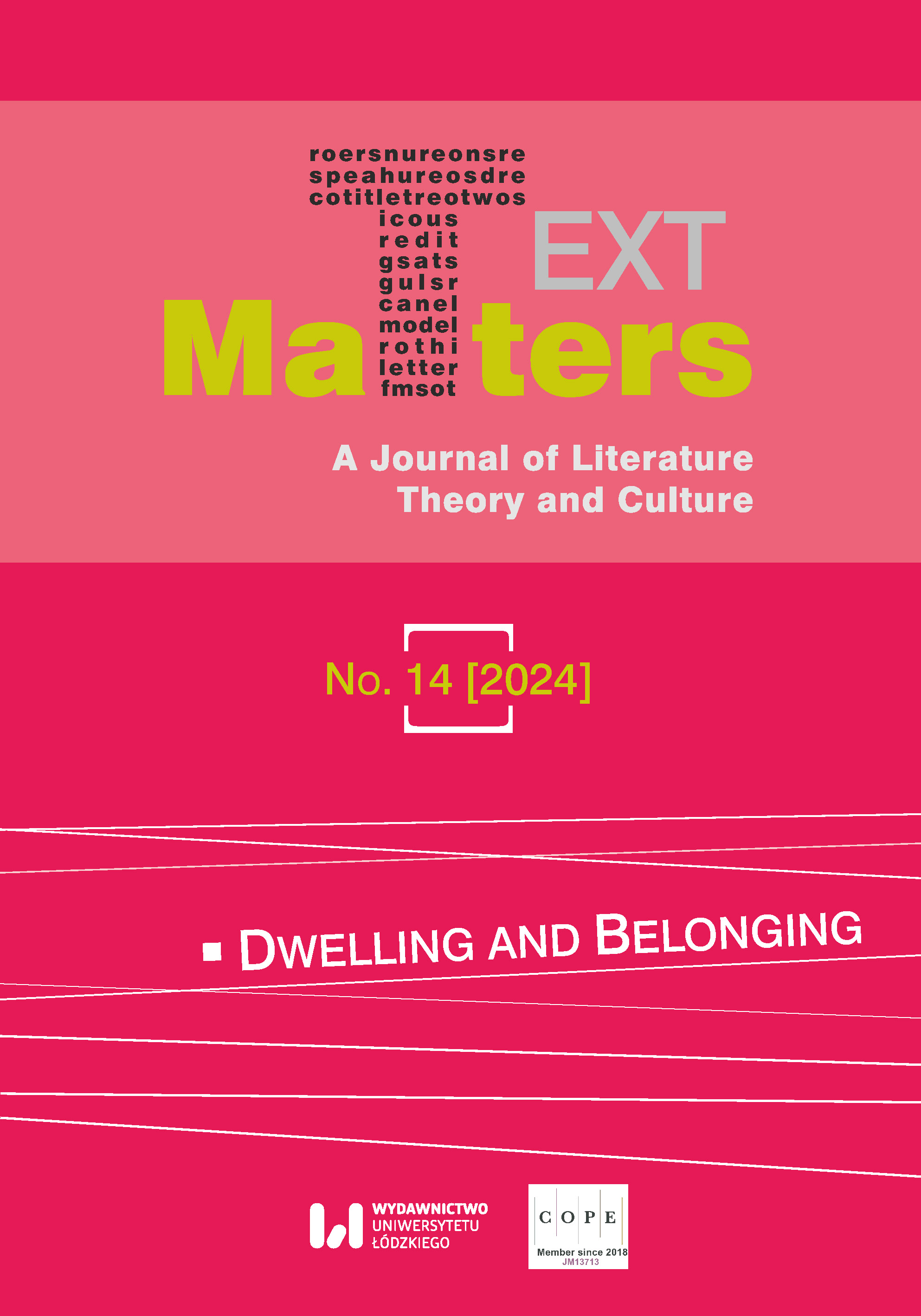Dwelling and Departure: Beginning Disputes between Arendt and Heidegger
DOI:
https://doi.org/10.18778/2083-2931.14.02Keywords:
Arendt, Heidegger, natality, dwelling, thinking, exileAbstract
In “Letter on Humanism,” Martin Heidegger juxtaposes the notion of homelessness (Heimlosigkeit) with home-coming (Heimholung), i.e. the reawakening to our original relationship to Being. This focus on dwelling in Being represents an interesting modification from his earlier study of “incipience” (Anfang), which emphasizes departure. We follow the critique of this shift in thinking in Hannah Arendt’s work, beginning with a short allegory titled “Heidegger the Fox” (1953). We suggest that reading this allegory in the light of Arendt’s decades-long debate with Heidegger illuminates the tense relationship between dwelling and incipience (or in her terms, “natality”). Though we do not attempt a complete analysis of Heidegger and Arendt’s works here, we aim to draw out specific movements of their thinking. We suggest that Arendt’s concept of natality, which, though partly influenced by Heidegger, ultimately challenges the authenticity of Heidegger’s solitary, silent thinker who dwells in the House of Being. In the back and forth between their thinking an unresolvable tension between dwelling and departure arises as the existential fissure.
Downloads
References
Arendt, Hannah. “Die wahre Geschichte von dem Fuchs Heidegger.” 1953. Denktagbuch 1950–1973, Volume 1, edited by Ursula Ludz and Ingeborg Nordmann, Piper, 2002, pp. 403–04.
Google Scholar
Arendt, Hannah. “Heidegger the Fox.” 1953. Translated by Robert Kimber and Rita Kimber. Essays in Understanding 1930–1954, edited by Jerome Kohn, Schocken, 1994, pp. 361–62.
Google Scholar
Arendt, Hannah. “Martin Heidegger at Eighty.” 1969. Translated by Albert Hofstadter. New York Review of Books, 21 Oct. 1971, https://www.nybooks.com/articles/1971/10/21/martin-heidegger-at-eighty/ accessed 15 Jan. 2023.
Google Scholar
Arendt, Hannah. “Martin Heidegger ist achtzig Jahre alt.” Merkur, no. 10, 1969, https://www.merkur-zeitschrift.de/artikel/martin-heidegger-ist-achtzig-jahre-alt-a-mr-23-10-893/ accessed 15 Jan. 2023.
Google Scholar
Arendt, Hannah. The Human Condition. 1958. U of Chicago P, 1998. https://doi.org/10.7208/chicago/9780226924571.001.0001
Google Scholar
DOI: https://doi.org/10.7208/chicago/9780226924571.001.0001
Arendt, Hannah. The Life of the Mind. Harcourt, 1978.
Google Scholar
Arendt, Hannah. The Origins of Totalitarianism. New edition with added prefaces. Harcourt, 1968.
Google Scholar
Augustine. Confessions. Edited by Michael P. Foley, translated by F. J. Sheed, Hackett, 2007.
Google Scholar
Burton, Adi. “Ritual as Praxis: The Responsibility of Activists in the Face of Genocide; or, Between Ethics and Politics.” 2022. U of British Columbia, PhD dissertation. https://doi.library.ubc.ca/10.14288/1.0418459
Google Scholar
The Hebrew Bible. Volume 1. Translation and commentary by Robert Alter, W. W. Norton, 2019.
Google Scholar
Heidegger, Martin. “Bauen Wohnen Denken.” 1951. Vorträge und Aufsätze, edited by Friedrich-Wilhelm von Herrmann, Vittorio Klostermann, 2000, pp. 145–64.
Google Scholar
Heidegger, Martin. “Brief über den Humanismus.” 1946. Wegmarken, edited by Friedrich-Wilhelm von Herrmann, Vittorio Klostermann, 2004, pp. 145–94. https://doi.org/10.5771/9783465141839-313
Google Scholar
DOI: https://doi.org/10.5771/9783465141839-313
Heidegger, Martin. “Building, Dwelling, Thinking.” 1951. Poetry, Language, Thought, translated by Albert Hofstadter, Perennial Classics, 2009, pp. 141–60.
Google Scholar
Heidegger, Martin. Discourse on Thinking: A Translation of Gelassenheit. 1959. Translated by John M. Anderson and E. Hans Freund, Harper & Row, 1966.
Google Scholar
Heidegger, Martin. “Gelassenheit (30. Oktober 1955).” Reden und andere Zeugnisse eines Lebensweges 1910–1976, edited by Hermann Heidegger, Vittorio Klostermann, 2000, pp. 517–29.
Google Scholar
Heidegger, Martin. “Letter on Humanism.” 1946. Basic Writings, edited by David Farrell Krell, translated by Frank A. Capuzzi, Harper & Row, 1977, pp. 189–242.
Google Scholar
Heidegger, Martin. Über den Anfang. 1941. Edited by Paola-Ludovika Coriando, Vittorio Klostermann, 2005.
Google Scholar
Heidegger, Martin. Was heißt Denken? 1951–52. Edited by Paola-Ludovika Coriando, Vittorio Klostermann, 2002.
Google Scholar
Heidegger, Martin. What Is Called Thinking? 1951–52. Translated by Fred D. Wieck and J. Glenn Gray, Harper & Row, 1968.
Google Scholar
İlhan Demi̇Ryol, Gaye. “‘That There Be a Beginning’: Arendt and Natality.” Uluslararası Sosyal Bilimler ve Sanat Araştırmaları, vol. 2, no. 1, 2023, pp. 120–31. https://doi.org/10.32955/neuissar202321681
Google Scholar
DOI: https://doi.org/10.32955/neuissar202321681
Kohan, Walter Omar. “On the Present of the Question.” University of British Columbia, 19 Oct. 2022. Online presentation.
Google Scholar
Maslin, Kimberly. The Experiential Ontology of Hannah Arendt. Lexington, 2020.
Google Scholar
DOI: https://doi.org/10.5771/9781793612458
Plato. “Theaetetus.” Translated by M. J. Levett, revised by Myles Burnyeat. Complete Works, edited by John M. Cooper, Hackett, 1997, pp. 157–234.
Google Scholar
DOI: https://doi.org/10.2307/4351800
Rilke, Rainer Maria. “Duino Elegies (1923).” The Poetry of Rilke, translated and edited by Edward Snow, North Point, 2009, pp. 281–346.
Google Scholar
Taminiaux, Jacques. The Thracian Maid and the Professional Thinker: Arendt and Heidegger. Translated by Michael Gendre, SUNY P, 1997.
Google Scholar
Vatter, Miguel. “Natality and Biopolitics in Hannah Arendt.” Revista de ciencia política (Santiago), vol. 26, no. 2, 2006, pp. 137–59. http://dx.doi.org/10.4067/S0718-090X2006000200008
Google Scholar
DOI: https://doi.org/10.4067/S0718-090X2006000200008
Vega, Facundo. “Fox Traps: Heidegger, Arendt, and the An-archy of Political Beginnings.” Why Arendt Matters/Pourquoi Arendt importe, 25–26 Apr. 2017, Laboratoire du Changement Social et Politique, Université Paris Diderot, Paris.
Google Scholar
Vega, Facundo. “On Bad Weather: Heidegger, Arendt, and Political Beginnings.” Weathering: Ecologies of Exposure (Cultural Inquiry. Volume 17), edited by Christoph F. E. Holzhey and Arnd Wedemeyer, ICI Berlin, 2020, pp. 227–43. https://doi.org/10.37050/ci-17_11
Google Scholar
DOI: https://doi.org/10.37050/ci-17_11
Villa, Dana R. Arendt and Heidegger: The Fate of the Political. Princeton UP, 1996. https://doi.org/10.1515/9781400821846
Google Scholar
DOI: https://doi.org/10.1515/9781400821846
Wolf, Arthur C., and Barbara Weber. “Existential Urgency: A Provocation to Thinking ‘Different.’” Childhood & Philosophy, vol. 19, 2023, pp. 1–25. https://doi.org/10.12957/childphilo.2023.71997
Google Scholar
DOI: https://doi.org/10.12957/childphilo.2023.71997
Published
Versions
- 2024-11-28 (2)
- 2024-11-28 (1)
How to Cite
Issue
Section
License

This work is licensed under a Creative Commons Attribution-NonCommercial-NoDerivatives 4.0 International License.













